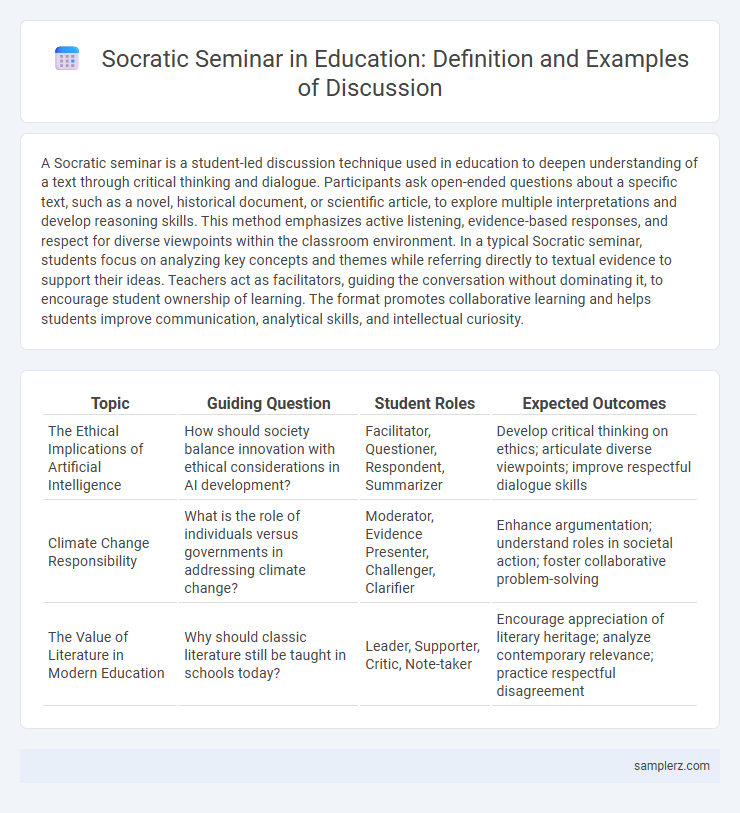A Socratic seminar is a student-led discussion technique used in education to deepen understanding of a text through critical thinking and dialogue. Participants ask open-ended questions about a specific text, such as a novel, historical document, or scientific article, to explore multiple interpretations and develop reasoning skills. This method emphasizes active listening, evidence-based responses, and respect for diverse viewpoints within the classroom environment. In a typical Socratic seminar, students focus on analyzing key concepts and themes while referring directly to textual evidence to support their ideas. Teachers act as facilitators, guiding the conversation without dominating it, to encourage student ownership of learning. The format promotes collaborative learning and helps students improve communication, analytical skills, and intellectual curiosity.
Table of Comparison
| Topic | Guiding Question | Student Roles | Expected Outcomes |
|---|---|---|---|
| The Ethical Implications of Artificial Intelligence | How should society balance innovation with ethical considerations in AI development? | Facilitator, Questioner, Respondent, Summarizer | Develop critical thinking on ethics; articulate diverse viewpoints; improve respectful dialogue skills |
| Climate Change Responsibility | What is the role of individuals versus governments in addressing climate change? | Moderator, Evidence Presenter, Challenger, Clarifier | Enhance argumentation; understand roles in societal action; foster collaborative problem-solving |
| The Value of Literature in Modern Education | Why should classic literature still be taught in schools today? | Leader, Supporter, Critic, Note-taker | Encourage appreciation of literary heritage; analyze contemporary relevance; practice respectful disagreement |
Introduction to Socratic Seminars in Education
Socratic seminars in education involve guided discussions where students critically analyze texts through open-ended questions, promoting deep comprehension and collaborative learning. An example includes a literature class discussing themes in Plato's "Republic," where students explore philosophical ideas by referencing specific passages and responding to peers' interpretations. This method enhances critical thinking, communication skills, and engagement with complex material.
Key Principles of Socratic Dialogue
Socratic seminars emphasize open-ended questioning to foster critical thinking and deep understanding among students. Participants engage in cooperative dialogue grounded in active listening, respect for diverse perspectives, and continuous inquiry. The key principles include disciplined questioning, reflective responses, and a shared commitment to exploring fundamental ideas rather than debating for victory.
Preparing Students for a Socratic Seminar
Preparing students for a Socratic seminar involves teaching them how to formulate open-ended questions and engage in critical thinking through active listening and respectful dialogue. Educators can use text annotations and collaborative note-taking to help students identify key themes and evidence within the reading material. Practicing small group discussions prior to the seminar builds confidence and fosters a deeper understanding of the subject, ensuring meaningful participation.
Example Socratic Seminar: Analyzing a Classic Text
Students engage in a Socratic Seminar by analyzing Plato's "Allegory of the Cave," exploring themes of perception and reality through open-ended questions that encourage critical thinking. Participants support their interpretations with direct evidence from the text, fostering a collaborative dialogue that deepens understanding of philosophical concepts. This method promotes active listening and respectful debate, essential skills in educational discourse.
Guiding Questions for Effective Discussion
Guiding questions in a Socratic seminar are designed to promote critical thinking and deepen understanding by encouraging participants to explore multiple perspectives on the text. Effective questions often focus on "why" and "how" to challenge assumptions and invite evidence-based reasoning, such as "What is the author's main purpose?" or "How does this idea relate to our current context?" These open-ended questions help maintain a dynamic and thoughtful discussion, fostering analytical skills that are essential in educational environments.
Student Roles During a Socratic Seminar
In a Socratic Seminar, students actively listen, pose open-ended questions, and provide evidence-based responses to deepen understanding. Roles include discussion leader who guides the conversation, summarizer who recaps key points, and devil's advocate who challenges ideas to encourage critical thinking. This structure fosters collaborative dialogue and promotes higher-order reasoning skills among participants.
Real Classroom Socratic Seminar Scenario
In a real classroom Socratic seminar, students engage in open-ended dialogue about texts such as Plato's "Allegory of the Cave," encouraging critical thinking and deep textual analysis. The teacher acts as a facilitator, guiding students to ask probing questions and challenge assumptions while fostering a respectful and collaborative environment. This method enhances comprehension and promotes skills in argumentation, active listening, and evidence-based reasoning essential to advanced education.
Assessing Participation and Critical Thinking
In a Socratic seminar, assessing participation involves monitoring the frequency and relevance of each student's contributions to gauge engagement. Evaluating critical thinking requires analyzing the depth of questions posed, the ability to connect ideas, and the use of evidence in arguments. Tracking these metrics helps educators measure students' analytical skills and active involvement in collaborative learning.
Common Challenges in Socratic Seminars
Common challenges in Socratic seminars include participants struggling with active listening and staying on topic, which can hinder meaningful dialogue. Students often find it difficult to ask open-ended questions that promote critical thinking, leading to surface-level discussions. Managing dominant voices while encouraging quieter students to contribute remains a key obstacle to creating an inclusive and balanced seminar environment.
Benefits of Socratic Seminars for Student Learning
Socratic seminars enhance critical thinking by encouraging students to analyze texts deeply and articulate their interpretations clearly. This method fosters collaborative learning, as students build on each other's ideas to develop a richer understanding of complex topics. Participation in these discussions improves communication skills and promotes intellectual curiosity, leading to higher student engagement and retention of knowledge.

example of socratic seminar in discussion Infographic
 samplerz.com
samplerz.com